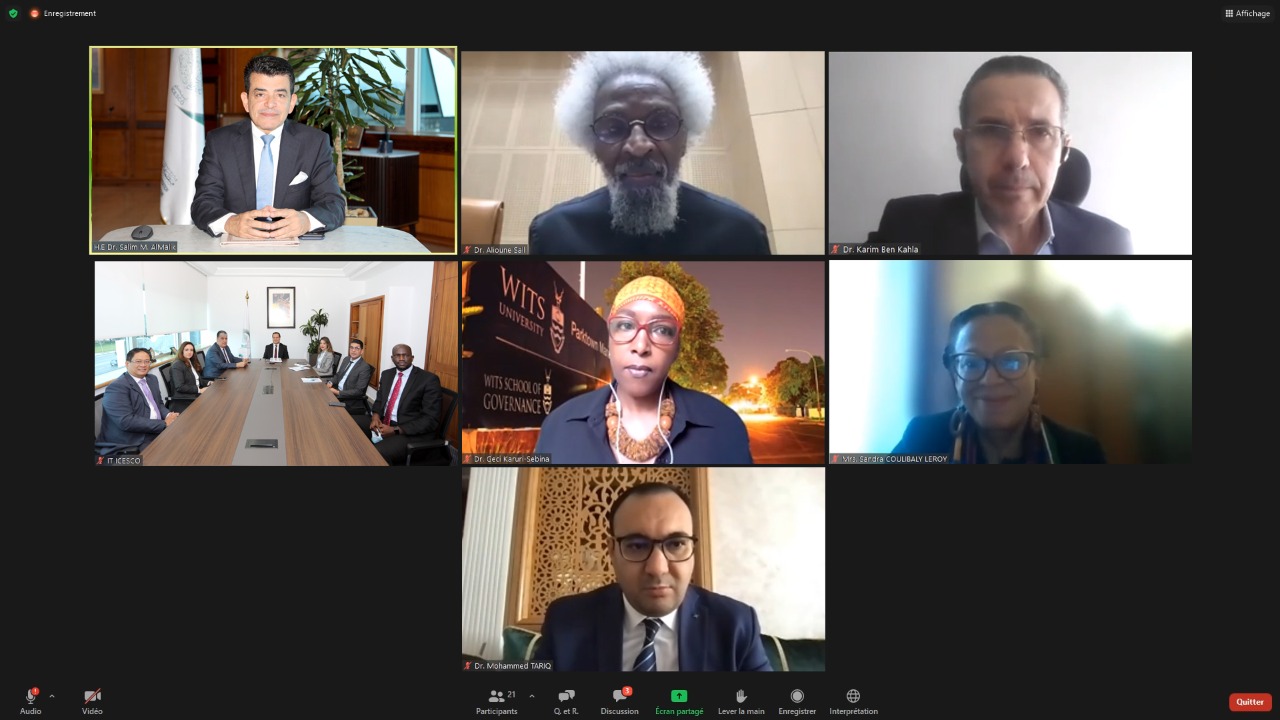
Roundtable Meeting Reviews the findings of ICESCO’s Study on the Futures of the African Continent

10 February 2022
The Center for Strategic Foresight at the Islamic World Educational, Scientific and Cultural Organization (ICESCO) held a roundtable meeting to present the outlines and preliminary findings of its study, prepared by a host of international experts and specialists on the “Possible Futures of the African Continent.” The meeting aimed to identify the best practices considering the new global trends and their consistency with the African reality and better understand the necessary factors to achieve the desired progress in the African continent.
At the outset of the meeting, held on Thursday, 10 February 2022, via videoconference, Dr. Salim M. Al-Malik, ICESCO Director-General, gave an address wherein he indicated that ICESCO includes 26 African countries in its membership, adding that it strives to meet their needs through various programs for the benefit of different groups, especially women and youth.
He added that ICESCO Center for Strategic Foresight’s Study on the “Possible Futures of the African Continent” represents an opportunity to examine the current scenario, consider opportunities at the continental level and clarify ways to develop Africa. “ICESCO is committed to contributing to the efforts geared towards providing an innovative solution to the major challenges facing Africa towards 2050. It also plays its pivotal role in promoting the culture of foresight to build a better African future,” stressed ICESCO DG.

Afterward, the participants in the meeting, which was moderated by Dr. Kais Hammami, Director of ICESCO Center for Strategic Foresight, and his team, reviewed the findings of the study. Dr. Alioune Sall, Executive Director of the African Futures Institute, South Africa, stressed the importance of analyzing the current situation in Africa to understand the process of change in the continent and identify its future prospects. Dr. Jacy Karoy Sibena, Assistant Professor at the School of Governance at the University of the Witwatersrand in South Africa, indicated that innovation and technological development are still below the required level in Africa, particularly with the Covid-19 pandemic that has affected the economy.
For his part, Dr. Mohammed Tariq, Professor at the Faculty of Legal, Economic and Social Sciences, Hassan II University of Mohammedia, Kingdom of Morocco, gave a presentation on the future of youth in Africa after the Covid-19 pandemic, wherein he stressed that the continent’s youth face many challenges related to health care, education, unemployment and terrorism, adding that youth are at the forefront of digital transformation.
Dr. Karim Benkahla, Professor at the Ecole Supérieure de Commerce de Tunis, Tunisian Republic, reviewed the social, climatic, economic and security risks facing Africa, the factors of change, namely education and human capital, and the possible scenarios for the future of the continent. Ms. Sandra Coulibaly Leroy, Programming and Evaluation Department at the International Organization of the Francophonie (OIF), touched on the repercussions of the COVID-19 pandemic on cultural action and creative industries in Africa.
In his closing speech, ICESCO DG reaffirmed that Africa has a great and prosperous future, pointing out the importance of the expected recommendations of the study in contributing to the development of African countries to be at the forefront of developed countries. Afterward, the floor was open for the participants to exchange remarks and ideas.




